The next French, Czechoslovak, West German, Italian, Spanish, Danish– ugh, this is hard work–Lithuanian, Swedish, Dutch... (Just say "Euro-trash douchebag," it will rescue you from the geographic gymnastics routine you are currently trying to perform.) Thanks, I'll give it a try. The next Euro-trash douchebag to lay a finger on Ethel, the frequently on the move woman at the centre of The Public Woman (La Femme Publique), is going to feel the wrath of my no-nonsense Canadian fist slamming against their infrequently washed face. Oh, don't get me wrong, I get what the film, directed by Andrzej Żuławski (Szamanka and Possession), was going for. It's just that I was growing increasingly tired of seeing Ethel being pushed around by a bunch of ambiguously European pansies as the film progressed. But then it dawned on me. If a French or Polish woman with shapely legs and a demented disposition isn't being driven more insane than she already is by the men in her life or enduring psychological torment caused by outside forces beyond her control, it wouldn't be an Andrzej Żuławski film, now would it? In a rare twist, however, some of the characters in this film are fully aware of the lunacy around them. Meaning, if they see something that is straight-up meshugganah, they will call that shit out. This happens on a few occasions over the course of this film, but the first time it does, I was somewhat taken aback. I mean, the act of pointing out someone's lack of mental fortitude in an Andrzej Żuławski seems like it would be an activity fraught with unintended/unforeseen consequences.
You think calling people "crazy" in an Andrzej Żuławski film is weird, wait until you see the third act car chase. And not only that, a third act car chase that features an Uzi being fired from one of the cars involved in the chase. An Uzi!!!!! This is definitely not your typical slice of arty European cinema.
Don't worry, though, there's still plenty of relationships of a psychosexual nature, tons of pontifical dialogue, and the usual amount of Steadicam shots of fashion forward women walking briskly through the streets of French and/or Polish cities to savour in this film.
The way I usually determine how I'm going to feel about an Andrzej Żuławski film begins and ends with the performance given by the lead actress, and, of course, by the quality of her wardrobe.
Now, we all know what my feelings are when it comes to the first-rate crazy Isabelle Adjani and Iwona Petry put out there in the Andrzej Żuławski films they appeared in. So, the question on everyone's mind is: How does Valérie Kaprisky measure up?
And she's off! Wasting very little time, we're shown Valérie Kaprisky walking briskly down a smoke-filled street right from the get-go. Seriously, there's no establishing shot or subtle lead in, the sight of Valérie Kaprisky stomping down the street in an authoritative manner is the first thing we see. I have no idea where she's going, but I do have a strong feeling it's going to involve a shitload of hysterical shouting. Okay, she, Ethel (Valérie Kaprisky), just handed some guy in a restaurant a wad of a cash (she actually told a waitress to give it to him), and now some of the other restaurant patrons are trying to take the money away from him. A brawl ensues. Head-butting one of them and throwing another out a window, it would seem that the guy Ethel gave the money to knows how to handle himself.
Hurling herself down an alleyway while blubbering and screaming incoherent nonsense, Ethel is already becoming unhinged. Oh, wait, it's just clever editing device. You see, she's not blubbering because of the brawl she just witnessed, she's actually on her way to an audition for a role in the latest film by Lucas Kessling (Francis Huster), the new face of European independent cinema (he's on the cover of the latest issue of Cahiers du Cinéma).
Reciting dialogue from the script for a group of producers, things, judging by their unmoved faces, seem to be going rather poorly. While the producers don't see anything in her, Lucas thinks otherwise and introduces himself to the inexperienced actress/model.
We get a taste of what Ethel's modeling career entails in the next scene, as she poses nude for some creep at a photo studio. (Poses nude?) Yeah, that's not the right term for what she does in this scene. I think spastic nude aerobics is a more apt description. Anyway, after dancing naked to some kind of new wave techno Euro-funk for a rather lengthy period of time, Ethel gets dressed and leaves. Oh, before she goes, the creep with the camera (Roger Dumas), tries to chat with Ethel, who cuts him off mid-sentence and says, "Did I ask you anything?" In other words, don't ever talk to me again, creep.
Felt up by the photo studio's female secretary and groped by a guy in a parking garage elevator, it would appear that Ethel can't go anywhere without being molested by strangers.
It should be noted that every scene starts with Ethel on the move. And even though the film is fast-paced and full of energy without them, these walking intro thingies give the film a real sense of urgency. Where is she going? And why is she walking so fast? These are the type of questions that dart through the minds of normal people.
All I could think about, on the other hand, was what the exact temperature was inside Ethel's pantyhose. (Oh, boy. Here we go.) What? You didn't think I was going to write a review for La Femme Publique and not mention the abundance of pantyhose in this movie? This is the most pantyhose friendly movie I've seen in years. (It's just that I don't think that's what Andrzej Żuławski going for when he set out to make this movie.) He didn't, eh? Well, I don't give a shit. You put an attractive actress in pantyhose and parade her around an urban setting for ninety-plus minutes in said pantyhose, I'm going to take notice.
Putting aside all this pantyhose talk for a second, let's discuss those dresses Ethel likes to wear. Now, I don't know what you would call them exactly, but the style of dresses Ethel wears throughout this movie did nothing but intensify her pantyhose ensnared legs and hips. (Wait, did you say, hips?) I did.
The dresses, a sort of new wave-tinged, Roman-style mini-tunic, have slits down the side that go all the way up to the waist. Meaning, you can totally see her hips. And since she never goes anywhere without her lower half poured into either black or grey pantyhose, her pantyhose-accentuated hips are constantly on display. Depending on the strength of the wind or the level of exuberance of the wearer's movements, you can also see pantyhose-accentuated side-booty.
Hello? You still there? Oh, there you are. It looked you were about to pass out.
Don't be ashamed, I almost did too. I'll give you a quick example. It occurs when Ethel, who is shacking up with a Czech dissident named Milan (Lambert Wilson). It's somewhat complicated as to how Ethel ended up living with this Milan fella, but... It's not important. Well, it is important, just not to the point I'm trying to make here. Stay focused. There's a scene in Milan's apartment where Ethel puts on these gold pumps that literally had me bouncing off the walls...of my padded cell.
After putting on the gold pumps, Ethel gets up and begins to clear the table. What's happens next is hands down one of the sexiest things I've ever seen. (Isn't this the film where Valérie Kaprisky dances naked on three separate occasions?) Oh, I see what you're saying. But, no, I still say Valérie Kaprisky clearing the table in a green new wave-tinged, Roman-style mini-tunic; gold strappy heels; and jet black pantyhose is way sexier. But, hey, that's just me.
While rehearsing for Lucas Kessling's film, an adaptation of Fyodor Dostoyevsky's "The Possessed" (a.k.a. Demons), it becomes clear that Ethel is way over her head. Dressed in period costume (one of the rare of instances we see her out of her trademark mini-tunic) and surrounded by pompous French actors and a crew that obviously has little to no respect for her as an actress, Ethel struggles with the material. The scene that involves her performing a monologue about a large spider in a wardrobe in particular.
Screaming, "I don't understand what you mean! I don't understand what you want!" in response to Lucas' direction/meltdown, Ethel has lost all her confidence.
Did she just get fired? Who knows. But a strange plot twist occurs at this point. I'm not 100% sure, but I think Ethel is pretending to be Elena Mliska (Diane Delor), a Czech actress who has recently gone missing. Well, sort of missing. Her husband, Milan, says she went back to Czechoslovakia, but Ethel's not buying that. She thinks Elena was... murdered!
Nonetheless, Ethel moves in with Milan, dyes her hair red and starts dressing like Elena (gold pumps, baby). To complicate things even more, Ethel thinks Milan had a hand in the recent assassination of an important Lithuanian religious figure (the Archbishop of Kaunas, perhaps?)
While all this sounds somewhat convoluted, it's actually pretty straightforward. You see, Ethel wants to be a better actress. And what better way to improve your acting chops than by assuming the identity of a missing, presumed dead Czech actress and getting mixed up with her troubled, archbishop assassinating husband. At least that's what I think the film is about.
Either way, Valérie Kaprisky is gorgeous and Francis Huster and Lambert Wilson are both a couple of handsome motherscratchers. So, if you like watching attractive French people yelling at each other for a period of time no longer than two hours (stopping every now and then to fuck one another), then by all means seek out La Femme Publique. It will arouse your genitals and make you feel smart at the same time.
Important keywords: Pantyhose, Uzi, Mini-tunic, Gold pumps, Stand up sexual intercourse, Burnt sienna tights, Film within a film, Assassination, Fyodor Dostoyevsky, Peach coloured dress, Jeu de paume, Walking, Hair dye, Protest, Naked dancing, and Toothbrushing.















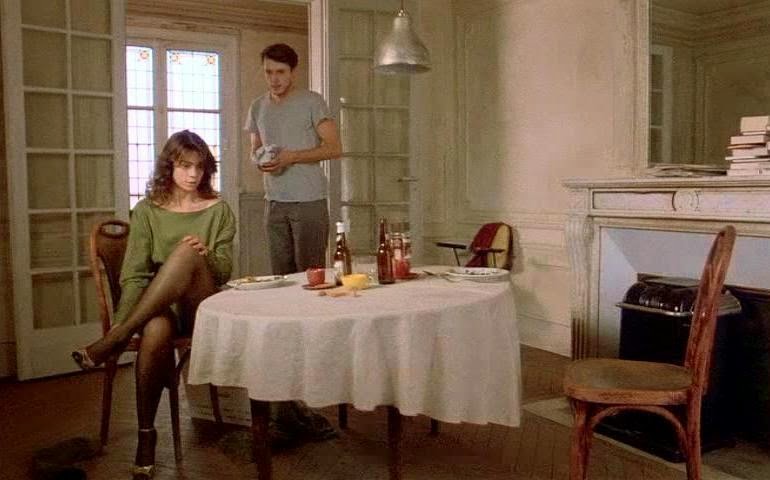











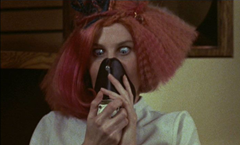
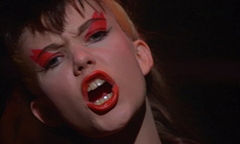





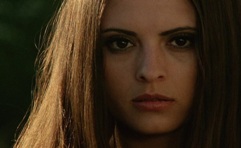


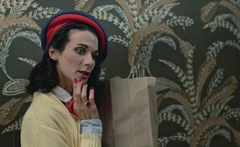
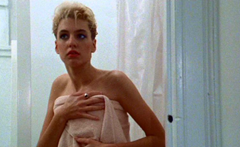
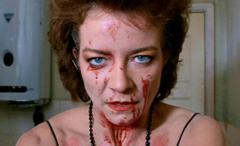
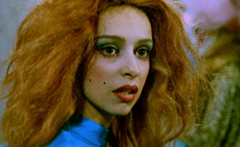




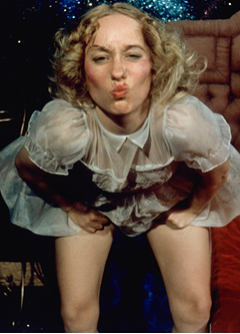


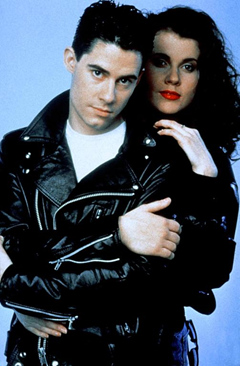


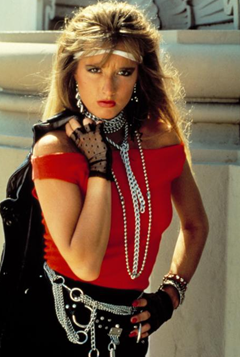




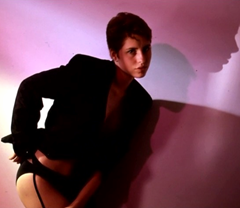
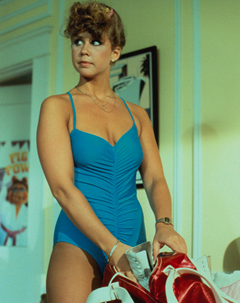


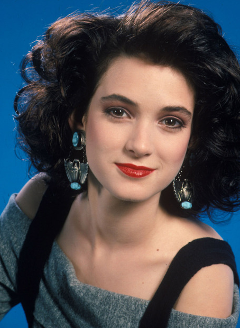










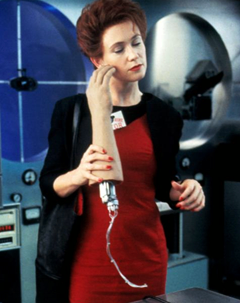


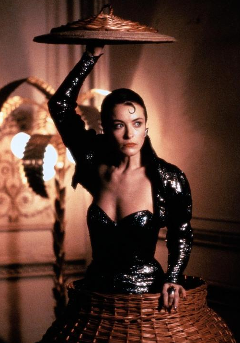


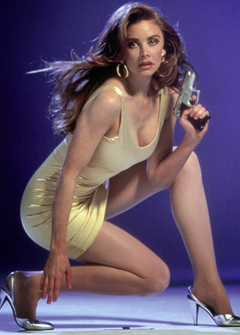
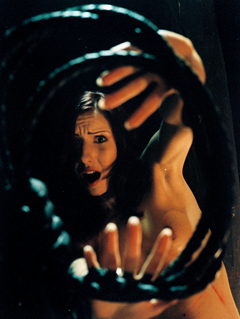
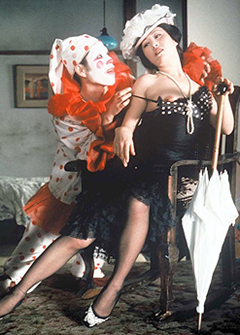
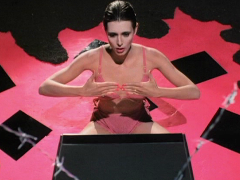
So great, one of my favorite Zulawski's. Kaprisky really goes for it. This actually wouldn't be a bad place to start for someone new to Zulawski. Its still batshit insane and gives a great example of his style but its not quite as out there as something like Possession or Szamanka. Really clever use of the film within a film scenario too, and its also essentially an adaptation within an adaptation with the film within the film being an adaptation of Dostoyevsky The Possessed!
ReplyDeleteYeah, it's not quite there... more like, The Double Life of Véronique on steroids.
Delete